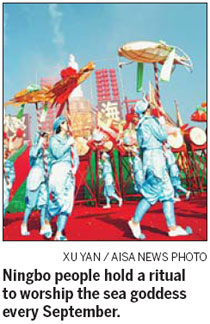Life and Leisure
Reflections on the sea and Ningbo
By Chen Jiayuan (China Daily)
Updated: 2010-11-04 07:53
 |
Large Medium Small |
The goddess Ruyi is toasted with wine by the Ningbo people to pray for protection at sea, before they sail accompanied by the sounds of gongs and drums.
Days later, they come back, ships loaded with fish, the best of which are sold at market and the rest of which are kept by the fishermen for their families.
It is a scene that is reenacted every year around Sept 15, in coastal Xiangshan county of Ningbo, Zhejiang province.
"Ningbo" means tranquil waves and describes well the city, where people are closely connected to the sea.
Seafood is a favorite of the locals and instead of using lots of seasoning they choose to cook in the simplest way, steaming, to keep the original flavor.

Either that, or they apply a thin layer of salt to dry the fish in the wind and preserve them for future eating.
When you eat fish here at a stall, don't turn over the fish as it is said to be a bad omen, meaning the fishermen's boats may turn over.
As opposed to the sandy beaches and blue water of Qingdao and Dalian, Ningbo's shoreline has mud banks, which crabs scuttle across. Since they are small they are hard to catch and the best method is to use a torch and dazzle them at night, before scooping them up.
Living near the sea has shaped the personality of Ningbo's residents.
In 1861, German geographer Ferdinand Freihher von Richthofen compared Ningbo merchants with Jews in his book China: The Results of My Travels and the Studies Based Thereon. He described Ningbo people as diligent, with the spirit of entrepreneurs.
Ningbo people are born migrants. They often venture off and seek a better life away from home, especially in the early and mid 20th century. Nurtured by sea water, Ningbo people often choose coastal areas such as Shanghai and Hong Kong to settle, where they can still enjoy a life by the sea.
The mobility of Ningbo people is the secret to making them stronger and more vigorous. There are many well-known Ningbo people, such as the founder of Hong Kong's worldwide shipping group, Pao Yue-kong, and Hong Kong media mogul, Run Run Shaw.
Though it is traditional for Ningbo people to run businesses, they value education. The well-preserved Tianyi Chamber, the oldest existing library in China, is evidence of this.
"The significance of Tianyi Chamber is not to nurture people by preserving books, but rather as a symbol of the classics and to tell people to preserve culture," says Yu Qiuyu, the well-known writer born in Ningbo, in his article Visiting Tianyi Chamber on a Rainy Day.
Today, Tianyi Chamber has become one of the most popular tourist sites in the city, attracting scholars, in particular.